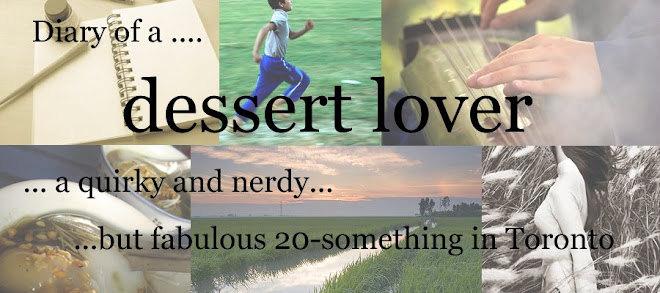 This book was part of the bag of goodies from LeBlanc's birthday gift. I had told him about aspiring to be more of a minimalist, and being more aware of my actions on the environment. Plus, we both love food. So it was a very thoughtful gift. :) (I'm asking him to read it, too, so we can discuss it!)
This book was part of the bag of goodies from LeBlanc's birthday gift. I had told him about aspiring to be more of a minimalist, and being more aware of my actions on the environment. Plus, we both love food. So it was a very thoughtful gift. :) (I'm asking him to read it, too, so we can discuss it!) In a nutshell, this book documented the journey this couple took, to try to eat food that was from a 100-mile radius from their home in Vancouver, British Columbia in Canada. It seems like a straight forward task, but a simple task it is not. The narration of each chapter is alternated between Alisa and James. We see how the diet impacts not only their eating habits, but their lives.
I learn that the average distance my food travels is 1,200 miles. (Then, I ran to my fridge and took a look at the sticker on my hot-house tomatoes. It said "Mexico.")
One of the main themes that really made me reflect was the lack of connection that we have with the things we use everyday, including the food that we eat. In losing that connection, we also lose a sense of our community. We get our veggies, dairy, and meats at the grocery stores, but we don't see where it comes from before that.
I, for one, did not even know where my tomatoes came from. All I cared about was that it was less than $1.29/lb and they were red and firm.
What about the farmers who grew them? Are they compensated justly for their labour? What about the fertilizers and pesticides used? Were they picked when they were ripe, or or were they picked so they could ripen on the journey to my supermarket? How much gas did it take to transport my tomatoes? How does this impact our environment?
If we were to take an inventory of all the food in our local supermarkets, how much of the food is local? How much food is from another province? Another country? Another continent?
Is it necessary for our food to travel such long distances? Is it sustainable to the environmen? Is it sustainable to the societies which support our consumption? Is it healthy for us?
And the list of unanswered questions continue.
I like this book because it is largely devoted to asking questions, and exploring different options. It doesn't seek to judge or condemn our society, it just asks questions. It also looks at how we have evolved, as a society, in the way which we get our food.
In the past, when we used to live off our lands, we would grow our crops, and then preserve the surplus so that we can live off of it during the seasons we cannot yield any crops (i.e., winter for us in Canada.) We don't do that anymore. We can buy our favourite foods, year round at our local supermarkets.
One story that particularly touched me, was about the salmon in their local river. Alisa and James had found a river where they could get salmon from, which was within their food radius. Looking forward to heading back to the river, to get more salmon to preserve for the winter, they were devestated when a spillage of a toxic chemical killed all lifeforms in the river. This meant there was no salmon for them this winter.
This story touched me becuase I think we no longer feel this connection with our environment: that we depend on our environment to survive. If I saw this on the news, I would think that it was sad news, but it would end there. It doesn't affect me on a personal level. But this book reminds us, that not too long ago, this kind of disaster would spell famine for all the people who lived in the village and depended on this salmon. Disasters such as this, might not affect us on a personal level today, but it used to, and it still can.
What would our community be like if we had more connection with the things we eat, with the things we use? Can you imagine buying your wheat from a farmer and knowing exactly how he grows it and processes it? Or what about picking your own berries from a local farmer and eating it sweet and ripe, straight from the plant?
In our fast paced world, it`s easy to get caught up in life, and we forget to enjoy the little things. We forget to ask questions, and we assume that things are just the way they are.
It`s also easy to forget that everything we use must come from somewhere, and sometimes, it`s important to know that whatever it is that we are using, we have a relationship with it. And it has a relationship to the earth. Maybe it`s time that we took a step back, and evaluate the decisions we are making, either consciously or unconsciously, and think about how they are affecting our lives, and our future.
What are your thoughts on local eating? Do you think its important to know where your food comes from?





2 comments:
We buys most of our vegetables and fruits at the market, those can't came from too far away. Now, about canned food? No idea.
Andy- That's great! I'm going to try to buy more locally. It's a good feeling having some clue where my food is coming from!
Post a Comment